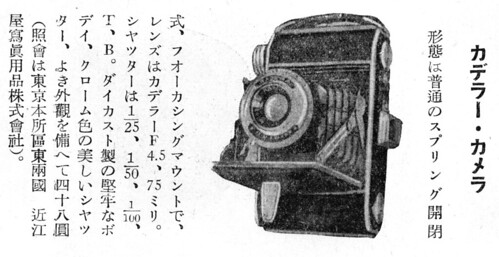Kadera
The Kadera (カデラー) is a Japanese 4.5×6 folding camera, which was distributed by Ōmiya Shashin-yōhin c.1939, and about which very little is known. (The name Kadera was also used for a 75mm f/3.5 three-element lens made by Gojō — successor of Kajiro Kōgaku — and mounted on the Semi Kinka in 1943.)[1]
Description
The Kadera camera is a vertical folder, with three-part folding struts inspired by the Ikonta 520. There is a folding optical finder, maybe of the Newton type — its front part folds over the rear one. The film is advanced by a knob at the bottom right, as seen by a photographer holding the camera horizontally. The release of the front door is at the top right, and the main release is on the shutter itself. The back is hinged to the left, and retained by a latch on the right, covered by a small handle.
The shutter is chrome-coloured and reportedly gives 25, 50, 100, T, B speeds.[2] It is certainly of the everset type, with the release lever directly protruding on the side. The name KADERA is barely legible at the top of the front plate on the only available picture. The lens is reported as a Kadera 75/4.5.[2] It was perhaps made by Kajiro Kōgaku, as the later Kadera f/3.5 lenses.[3]
Commercial life
The Kadera camera was featured in the new products column of the January 1939 issue of Asahi Camera.[2] The document briefly describes the camera, and quotes the price of ¥48. No other document mentioning the camera has been found, probably indicating that its commercial career was very brief. No surviving example has been observed so far.

|
| Kadera in Asahi Camera January 1939. (Image rights) |
Notes
- ↑ "Kokusan shashinki no genjōchōsa" ("Inquiry into Japanese cameras"), lens item Lb10.
- ↑ 2.0 2.1 2.2 Column in Asahi Camera January 1939, p.189.
- ↑ See Kajiro Kōgaku.
Bibliography
- Asahi Camera. "Atarashii kikai to zairyō" (新しい機械と材料, New equipment and materials), April 1940, pp.189–91.
- Asahi Camera (アサヒカメラ) editorial staff. Shōwa 10–40nen kōkoku ni miru kokusan kamera no rekishi (昭和10–40年広告にみる国産カメラの歴史, Japanese camera history as seen in advertisements, 1935–1965). Tokyo: Asahi Shinbunsha, 1994. ISBN 4-02-330312-7. Item 54. (Unlike most other cameras covered in this book, no advertisement is reproduced.)
- "Kokusan shashinki no genjōchōsa" (国産写真機ノ現状調査, Inquiry into Japanese cameras), listing Japanese camera production as of April 1943. Reproduced in Supuringu kamera de ikou: Zen 69 kishu no shōkai to tsukaikata (スプリングカメラでいこう: 全69機種の紹介と使い方, Let's try spring cameras: Presentation and use of 69 machines). Tokyo: Shashinkogyo Syuppan-sha, 2004. ISBN 4-87956-072-3. Pp.180–7. The Kadera camera is not directly listed in this document.
The Kadera is not listed in Sugiyama.
